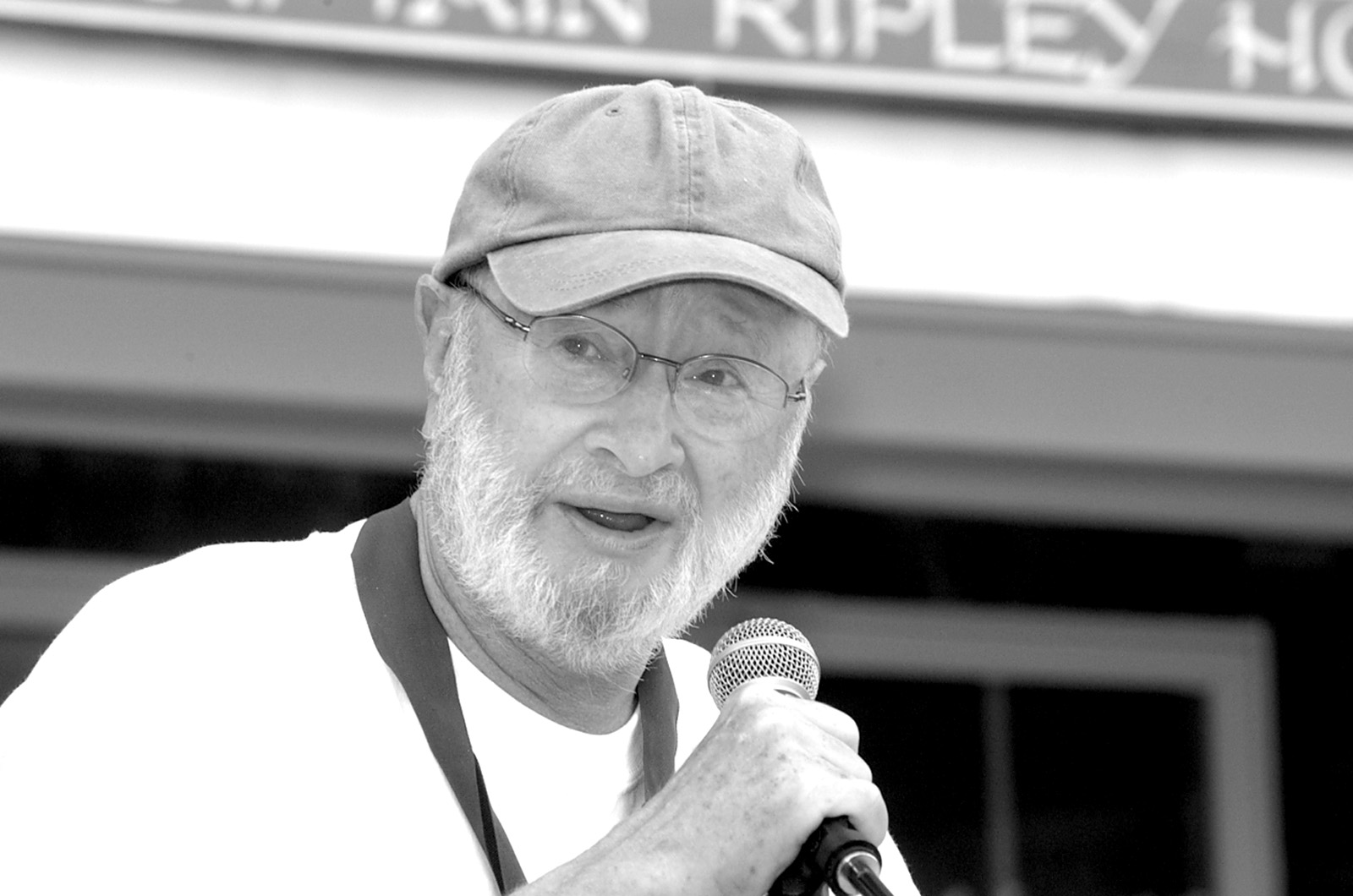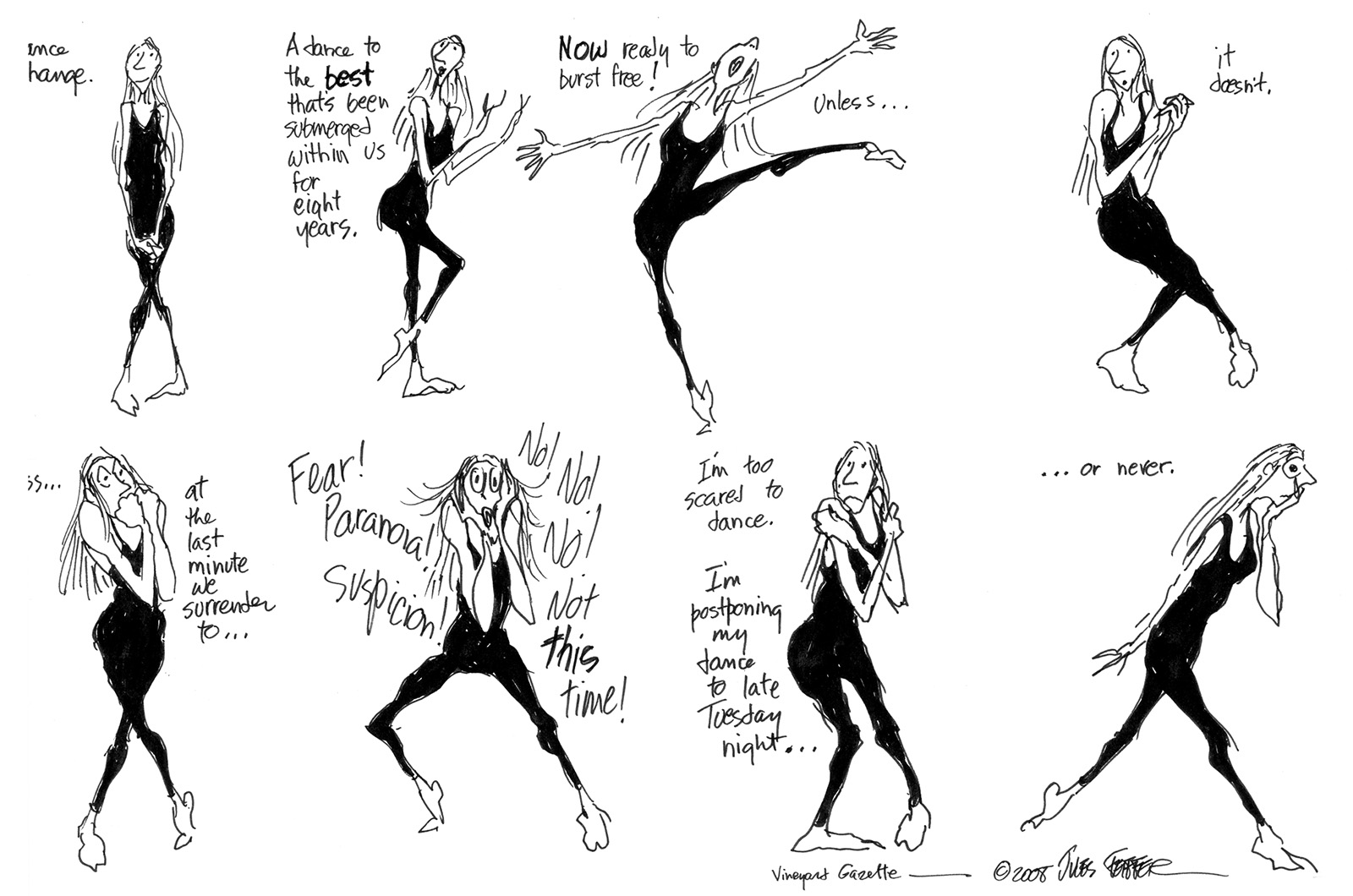Jules Feiffer, the Pulitzer-prize winning cartoonist, playwright, author and screenwriter, whose satirical wit and illustrations were for a time the voice of the Village Voice, and syndicated in hundreds of newspapers around the country, died on Jan. 17. He was 95.
Mr. Feiffer was a longtime Vineyarder who divided his time between here and New York City. He was a fixture in both worlds, a regular in the literary society of New York and at events all over the Island. He was prolific in many genres and for decades not a summer went by without Mr. Feiffer presenting a new book, play, movie or art exhibit on the Vineyard.
He gave readings and workshopped material at the Martha’s Vineyard Playhouse, led exhibits at the Field Gallery and introduced his children’s books at Bunch of Grapes bookstore, all while keeping up his weekly column in the Village Voice, which he wrote from 1956 to 1997.
In 1986, he won the Pulitzer Prize for cartooning and in 2004 was inducted into the Comic Book Hall of Fame. He wrote the screenplays for Carnal Knowledge and Popeye, among others, won an Obie for his play Little Murders, and collaborated with Norton Juster on the children’s book classic, The Phantom Tollbooth.
His success, he said in a 2010 interview with the Gazette following the publication of his memoir, Backing Into Forward, was the result of dogged determination.
“Accident, luck, desperation and the refusal to admit you’re beaten when you’re beaten — that’s what the memoir is about,” he said in the interview. “Your ambitions can be thwarted time after time. Pick up the pieces. Try again.”
Mr. Feiffer often collaborated with other Vineyarders, including film director Mike Nichols, most notably on Carnal Knowledge, starring Jack Nicholson, Ann-Margret and Art Garfunkel.
During a benefit performance for the Writers Guild of America, East Foundation in 2010, Mr. Nichols both lauded his friend and enjoyed a joke at his expense. He opened his tribute speech to Mr. Feiffer by saying: “A man who doesn’t have an enemy in the world, one who takes joy in the success of others ... it would be so much easier if we were honoring a man like that.”
He immediately followed this up with: “Truth is, working on a movie and three plays with Jules is as happy as I’ve ever been.”
At the same event, the comedian Robert Klein said that Mr. Feiffer managed to have “both an inferiority and a superiority complex at the same time.”
Jules Feiffer was born in the Bronx, N.Y. in 1929. He attended the Art Students League of New York and Pratt Institute in Brooklyn, and got his start in cartooning by apprenticing to famed cartoonist, Will Eisner.
His Village Voice column was entitled Sick, Sick, Sick (subtitled A Guide to Non-Confident Living), and from that perch he entertained readers and satirized those in power and politics for over 40 years.
Fellow West Tisbury cartoonist Paul Karasik said when he was growing up in Washington, DC, dreaming of being a cartoonist and illustrator, he worshiped the work of Mr. Feiffer.
“When I was young, he was God-like to me,” Mr. Karasik said.
Mr. Feiffer often said that one of his artistic inspirations was Fred Astaire, whose dancing, he said, made the difficult look easy. Mr. Feiffer’s illustrations frequently included a figure dancing, sometimes a self-portrait of sorts. An exhibit at the Field Gallery in 1999, his eighth consecutive show there at the time, featured many illustrations of a man in a top hat and tails flowing effortlessly across the page.
He was introduced to the Vineyard by Bob and Norma Brustein and soon chose it over his habitual haunt on Fire Island in New York.
“When I move my Adirondack chair to the lawn with a pad and paper and a book to read, I look around at my property — the trees, the beautiful day, what is mine — it gives me a greater sense of profound pleasure,” he said of the Vineyard in a 2009 interview with Martha’s Vineyard Magazine. “Relatedness to the three generations of children I’ve brought to Seth’s Pond to swim is more important, more vital, more to do with my core existence. My career wouldn’t have meant much without that to balance it out.”
Throughout the decades of raising children, Mr. Feiffer said Seth’s Pond became a habitual stop for any day on the Vineyard.
“When all my children were very little, Seth’s Pond became our headquarters for half the day,” he said. “It’s kind of moving for me to know that three generations of [our family] have owned Seth’s’ Pond — played in it, peed in it, polluted it.”
Mr. Feiffer began writing children’s books in 1993.
“I stumbled into children’s books and discovered I love doing it,” he said in a 2001 interview with the Gazette. “And unlike theatre it paid well.”
In an interview with the New York Times in 2003, he described the joy he found in creating children’s books this way: “All my working life, whether in the cartoons or in the theater, what readers and audiences saw of me was the satiric, abrasive side. There was no outlet to show the fun side, the affectionate side.”
His children and grandchildren were often the inspiration for his stories, and he collaborated with his daughter Kate Feiffer on four books.
“Back in the 1970s, I suspect that few people beyond me and my father knew that Mr. Blutherblutherblutherbluther lived in a mailbox at the entrance to Makonikey, on Lambert’s Cove Road,” Kate Feiffer wrote in an email, recalling her summers on the Island with her father, filled with imaginative characters. “We lived a bit further up the road, near Seth’s Pond, and when we drove by Mr. Blutherblutherblutherbluther’s house, we were sure to always yell out, ‘Hi Mr. Blutherblutherblutherbluther.’ My father was, in a word, fun. He knew how to play, and play we did — whether he was tossing me into the water at Seth’s Pond, or we were duking it out in a heated game of Aggravation or gin rummy on our screened-in porch or drawing cartoons together in his studio.”
Ms. Feiffer said her father always worked best on the Vineyard.
“He would spend afternoons on a lawn chair in our front yard, scribbling away on a yellow legal pad, reading and napping,” she wrote.
The prolific Mr. Feiffer never stopped creating, always looking to the next project. During the Writers Guild of America event he told the audience that when he was writing and drawing the world slipped away.”
“I’m not in control of it... when it’s really good I don’t know what I’m doing,” he said.
He also shared the secret to the longevity of his success.
“I am more eager to learn now, I value stupidity more.”









Comments (3)
Comments
Comment policy »